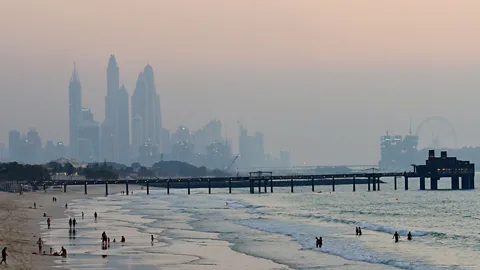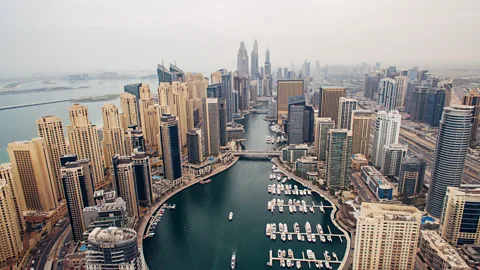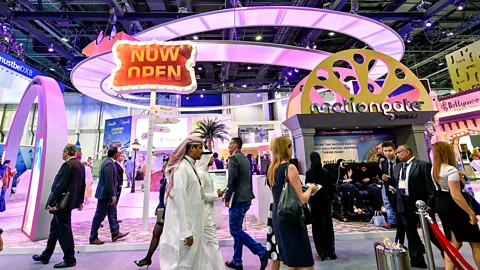Is the UAE still a high-paid expat haven?
 Getty Images
Getty ImagesLong considered a hotspot for high-paid foreign professionals, those on the ground say things aren’t quite what they once were.
Alison Simmonds returned to the UK in March after a two-year stint in the United Arab Emirates.
The communications consultant, who had travelled to the region for work for some years, decided to move out permanently to Dubai in January 2016 in search of some sunshine and a more active social life.
But even with “a significant personal and professional network”, it took her more than 12 months to find a suitable job. Even then, it was just a one-year contract.
Her take-home salary was higher than in the UK because she didn’t have to pay tax but being on a short-term contract gave her limited security. She paid monthly for her car and home, costing more than if she’d had annual leases.
Eight weeks before her contract ended, Simmonds, 45, began looking for a new job. “There was just nothing at an acceptable salary, so I came home,” she explains.
“I would like to go back at some point in the future, but now does not seem to be the right time. So many people are leaving, and a lot of very experienced and talented people are really struggling to find new positions.”
‘Employers’ market’
The oil-rich UAE is home to millions of expatriate workers of all levels and nationalities, lured by tax-free salaries and year-round sunshine.
The majority of foreigners live in the main business hubs of Abu Dhabi and Dubai, the latter a major tourist destination famous for luxury beach resorts, soaring buildings and glossy shopping malls.
 Getty Images
Getty ImagesExpatriates have helped to build and populate the UAE, which in 1980 was home to barely one million people, compared to today’s 9.5 million.
For years, the country was known as a place where professionals could earn high salaries and generous packages that included housing, education, healthcare, cars and travel. This allowed prudent expatriates to save, while others embraced a high-end life-style.
But like many of its Gulf peers, the UAE’s economy has come under considerable pressure in recent years due to falling oil prices, which has led to a slump in the real estate sector and a squeeze on salaries.
“Despite the recovery of global oil prices in 2018, economic growth remains moderate,” explains Keren Uziyel, an analyst at the Economist Intelligence Unit in London. She says this was due to OPEC-mandated oil cuts as well as geopolitical factors such as a diplomatic fall-out with Qatar and the US-imposed sanctions on Iran that have affected businesses, especially in Dubai.
The introduction of 5% VAT in January – a government move to plug revenue gaps from lower oil prices – created a perception of the UAE becoming a costlier business hub, Uziyel added. It also “considerably affected private consumption” due to higher costs for food, leisure activities and consumer goods, she says.
On paper, the UAE’s GDP growth for 2019 is forecast at a healthy 3.7%, says the IMF, but according to the Dubai Economy Tracker Index, published in November by local bank Emirates NBD, private sector growth fell to its lowest rate in two and half years and the employment index posted a contraction for the second consecutive month.
 Getty Images
Getty ImagesIn a recent article, the Wall Street Journal said Dubai was experiencing a “White Collar Recession”. One local economist said he felt this was an overstatement and remained “cautiously optimistic” on growth, but he accepted the economy was undergoing a “correction” as it matured.
Chris Greaves, managing director of recruitment firm Hays in the Middle East, says companies are “extremely cost conscious at the moment”.
According to his agency’s 2018 Salary and Employment Report, a third of companies surveyed said they were reducing headcount. More than half said there would be no salary increases.
“Some firms are cutting salaries to be able to maintain headcount,” Greaves says. “It’s also not uncommon to see companies make salary offers below a candidate’s existing package and for the person to still take the job. It is definitely an employers’ market right now.”
Shrinking salaries
Rohini Gill, a partner in Dubai-based HR management firm GGC Consultancy, says the UAE’s job market has “changed considerably” in the last few years.
“There has been a huge shift,” she says. “The UAE is no longer considered the hardship post that it was before, so you are no longer getting the big packages including extra money for school fees, health insurance, housing and so on. With the high cost of living here, it’s not making as much financial sense for a lot of people to be here any more.”
There’s also strong competition: According to Gill, a single job advert could receive as many as 5,000 applications, with many candidates from South East Asia with lower salary expectations.
Stephanie Hughes, a media content specialist from Hartlepool in the UK, moved out to Dubai four years ago with her husband, who is in construction.
“The market is very slow at the moment and I know so many people that are leaving because they can’t find jobs, or at least not ones that pay enough,” says the mother-of-two. “All the jobs I’m seeing seem to be offering 25% to 30% less that I am on now and it’s not viable when we have schools fees and health insurance to pay.”
 Getty Images
Getty ImagesIt’s a far cry from the days when the UAE was famous as a get-rich-quick destination.
One digital marketing executive, who declined to give his name due to career sensitivities, says a correction to the “farcical salaries” of the past was natural as the market matured.
But he believes things have “swung too far the other way”, saying: “What companies want and what they are prepared to pay for are two very different things.”
The 45-year-old has had six jobs since he moved to Dubai 10 years ago. He is still earning more than he was in the UK, but is now on less than when he arrived. He also spent 14 months unemployed before securing his current position.
“It was extremely tough and diminished a large proportion of our savings,” he says. His wife was also made redundant after her maternity leave, adding more pressure.
Going home is not always an option for those who have built lives in Dubai – they may not have a home, money to move or school places for their children.
“If you’ve been here a while, you need an exit strategy,” he says. “It drains you emotionally.”
Cheaper workers?
Filipina Hannah Zarah Bhatti came to Dubai three years ago to visit her mother, who has worked in the Emirate for nearly three decades, and found a job doing social media for a retail fashion brand.
The 28-year-old graduate is now doing marketing for a leading hotel brand.
She earns AED10,000 per month (about $2,720, £2,130), which is more than triple what she would get in the Philippines.
Some Western expats see workers like Bhatti as a threat because they are willing to accept lower salaries. Bhatti herself says she believes she earns less than colleagues of other nationalities.
Gill says she’s encountered Indian nationals with MBAs willing to work as finance assistants for AED7,000 per month ($1,900, £1,480), jobs previously done by Europeans, sometimes without degrees, earning double that.
Bhatti believes that her nationality made her more “in demand” from cost-conscious employers but feels it’s unfair to be paid less based on the colour of her passport.
“I am happy to have a job but it’s expensive to live here and I don’t manage to send much home to my family,” she says. “It’s also not an option for me to go back home,” she adds, citing low wages and other economic and social challenges.
Greaves says that even though wages are going down, he believes salaries are still higher than in workers’ usual home markets like the UK, Europe, Australia and the US, and crucially they are tax-free.
“It’s still an attractive place to work, even if companies are not paying inflated packages,” he says. “We are still receiving thousands of CVs, so the lure is still there for sure.”
This is not the first time the UAE’s economy has wobbled. In 2009, Dubai was among the highest-profile victims of the global financial crisis. The previously booming market went bust, seemingly overnight, before rebuilding and correcting previous excesses with tighter legislation.
In response to this latest economic softening, the government has unveiled a number of stimulus measures worth in excess of US$13 billion. New policies include: opening up certain business sectors to 100% foreign ownership; a more flexible visa regime; and cuts to business registration fees and other administrative costs.
These steps should make it a more attractive place to do business and help companies maintain – or even expand – headcount. Nonetheless, the job market is expected to remain incredibility competitive.
“You need to do your homework before you take a job out here,” says Gill. “It’s an expensive place and we know people who’ve come out planning to save but have found themselves eating into their savings just to cover their expenses.”
Back in the UK, Simmonds is grateful for her time in the UAE, but is quick to warn others not to risk too much for a job there. “I would not advise anyone to go out to look for work without a significant financial cushion because you will get into debt very quickly.”
“The days of Dubai’s roads being paved with gold was over by the time I arrived in 2016, but now I would say that gold is well and truly over the horizon and out of sight.”
To comment on this story or anything else you have seen on BBC Capital, please head over to our Facebook page or message us on Twitter.
If you liked this story, sign up for the weekly bbc.com features newsletter called "If You Only Read 6 Things This Week". A handpicked selection of stories from BBC Future, Culture, Capital and Travel, delivered to your inbox every Friday.
{"image":{"pid":""}}
